South Africa - Phelophepa Healthcare Train
South Africa - Phelophepa Healthcare Train
A Health Care Train, Bringing Hope And Better Health To Rural South Africa!
Introduction
The presentation below is based on a fact-finding mission performed in August 2001.
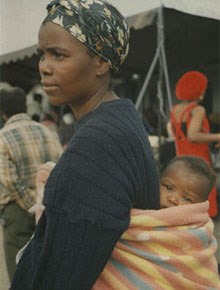
mother & child
Background
The word Phelophepa is a combination of Twsana and Sotho, two of the languages spoken in South Africa, with the meaning good clean health. The Phelophepa healthcare train is based on an idea from India, The Lifeline Express, which was the world's first hospital on a train.
The train is approximately 340 meters long and weighs just over 600 tons. This huge creation is adapted to the healthcare it offers to the community, to the staff and the students, who live, eat and work on the train.
The Phelophepa healthcare train project started in the beginning of 1993 as an eye care clinic, with 3 clinical coaches. Transnet (South African railway) and the Optometry Department of the Rand Afrikaans University, Johannesburg, collaborated and the Phelophepa healthcare train was created.
At the beginning of 1994 the train was expanded to 13 coaches, providing eye care, health education, medicine and health care. In 1995 the train received additional coaches for dental treatment. By the year 1996 the train had 16 coaches with room to offer counselling.
At present, the train stops at 36 different places in South Africa every year, with five working days at each stop. It covers most of the country, over a two year period, provides health care where the health service is inadequate or non-existing.
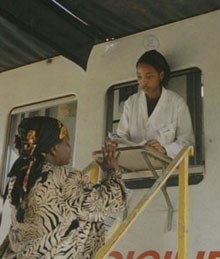
receiving a patient
Project Outlines
The major objective is to offer examination and education, consequently making people aware of their own health.
Offer services to complement other existing health services.
Provide services that currently do not exist, to the community.
Screening services at local schools in the nearby area.
The train has a permanent staff that manages the train and supervises the students.
The students are final year and postgraduate students from all over the country. Catering-, community health nurse-, dentistry-, dental hygienist-, optometry-, psychology- and pharmacy-students participate.
Many foreign students visit the Phelophepa healthcare train every year.
The dental clinic provides oral hygiene information, cleaning, restorations and extraction of teeth.
The students operate this clinic as all the other clinics on the train, under supervision of Dr Kamal Desai, the resident dentist. Universities usually send eight students to the train, six dental students and two oral hygienists.
Inside the dental clinic coach, there is a sterilization room and six dental chairs, one for scaling, two for restorative dentistry and three for extractions and minor surgery. Due to logistics, more advance treatments like endodontics and crown- and bridgework are not undertaken.
Six students work in the chairs, without assistance and one in the sterilization room. One student works outside with the screening. Taking a full history, often with help of sign language and an interpreter and using mirrors to determined the chief complaint.
The clinic is opened as long as there are patients and it is not unusual that the dental clinic has 80-90 patients a day.
The main aim of the dental program is to encourage dental care and preventing dental decay and removing the cause to the oral diseases. The main target is the child in the South African community. This is Jackie Masemola job, who lives permanently on the train. She is a representative of Colgate, one of the main sponsors. She travels to schools in every town or village within a travelling distance of each stop. She give lessons to the school children regarding basic oral hygiene and with a shining smile she gives out free toothbrushes and toothpaste, to provide oral health. In areas where people can not afford luxuries like oral health articles, she teaches them to make their own toothbrushes, toothpastes and dental floss.
- The health education clinic has an educational role. At each stop 21 volunteer members from the community are trained in basic health matters. At the end each volunteer receives a certificate.
- The eye clinic consists of a screening area outside. Inside the train are refraction rooms and a workshop where patients' custom made spectacles are prepared. Ready made readers are also available.
- The health clinic focuses on health education, but minor illnesses are also treated. Special attention is given to mother and baby care and guidance is given on healthy eating habits.
- The medicine clinic educate people how to take medication correctly - and its side effects. They have a pharmacy and provide medicine prescribed by the different clinics on the train.
- The psychology clinic conducts workshops within the communities and at schools, with the purpose enable communities to form support groups
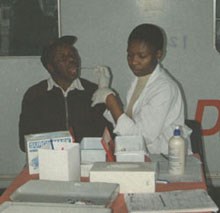
screening patients 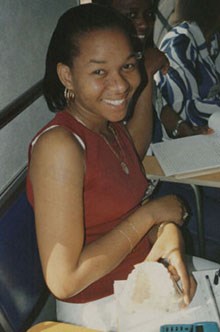
oral health education in the train
Achievements
Since 1993 the Phelophepa healthcare train has treated more than half a million people and treat more than 40 000 people annually in the different clinics.
Between 12th of June 1995 and 23rd of March 2001, 52 430 people have received treatment from the dental clinic. The treatment consisted of
82 884 extractions
5 796 fissure sealants
9 153 scaling and polishing
14 705 restorative procedures
198 680 children have been educated in oral hygiene and screened on different schools.
The Phelophepa Healthcare train is considered to be a great success. Both for the poor and rural people who are treated and for the students who get experience that money can not buy.
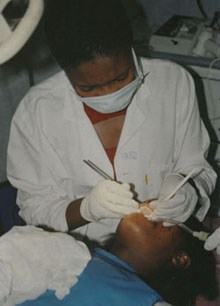
work goes on..
Thanks to all people that helped me; Dr Kamal Desai, Phelophepa Dental Clinic Manager, Jackie Masemola, Phelophepa Colgate Dental Educator, Cecelia Dintwa, Phelophepa Colgate Dental Nurse.
Guest editor: Sanjay Haryana, a final year dental student from the University of Malmö, Faculty of Odontology, Sweden visited the University of Pretoria, South Africa, to participate in these projects in august 2001.
